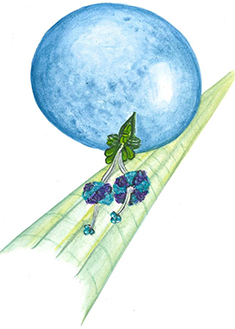PhD defence: The role of motor protein dynein on Kv7 channel trafficking in vascular smooth muscle
Jennifer van der Horst
PhD thesis
Hypertension is a chronic medical condition and affects more than 1.4 billion people worldwide. Despite the existing therapies, hypertension remains poorly controlled. Therefore, it is crucial to improve our understanding of the mechanisms involved in the pathophysiology of hypertension, which may provide new therapeutic targets to treat hypertension.
Vascular smooth muscle cells within the wall of an artery facilitate constriction and dilation and thus play a key role in determining total peripheral resistance. Voltage-gated K+ channels from the Kv7 family, namely Kv7.4 and Kv7.5, are particularly important regulators of VSMCs contractility in different rodent and human arteries. Furthermore, Kv7 channels are downstream targets for cAMP-dependent receptor-mediated vasodilation, including β-adrenergic receptors.
The trafficking of these ion channels and receptors into and away from the cell membrane must be carefully controlled to maintain an appropriate vascular tone. One mechanism of protein trafficking within the cell is along the microtubule network. The motor protein dynein can move along the microtubule network to transport cargoes away from the cell membrane towards the minus-end.
This PhD thesis aimed to investigate the role of the motor protein dynein on the microtubule-dependent trafficking of Kv7 channels in vascular smooth muscle and investigate whether pharmacologically interfering with dynein trafficking or disrupting the microtubule network could improve vascular tone in hypertensive arteries.
In study I, we demonstrated that dynein binds to Kv7.4 channels, and that dynein inhibition increased the Kv7 channel membrane expression and function, causing enhanced vasorelaxations in rat arteries. In arteries from hypertensive rats, Kv7.4 protein expression and function are reduced, partially underlying the attenuated β-adrenoceptor-mediated relaxation.
We found in study II, that microtubule depolymerization and dynein inhibition in arteries from hypertensive rats improved Kv7.4 channel function, thereby restoring the β-adrenoceptor-mediated relaxations. We conducted a human clinical trial in study III, providing translational evidence that acute colchicine treatment can improve the β-adrenoceptor-mediated vasodilation in hypertensive humans.
Together, these studies suggest that colchicine may be a promising novel therapeutic agent for hypertension and thereby reduce the incidence of cardiovascular disease.
2022, 186 pages.
Time
28 October 2022, 14:00
Venue
Festauditoriet, Bülowsvej 17, 2000 Frederiksberg.
Opponents
Professor Erik Richter (chair), Department of Nutrition, Exercise and Sports, University of Copenhagen, Denmark.
Lecturer in Biomedicine and Senior Research Scientist Sarah Bridget Withers, University of Salford and Salford Royal Foundation Trust, Salford, England.
Professor Ebbe Bødtjker, Aarhus University, Department of Biomedicine, Aarhus, Denmark.
Supervisor
Professor Ylva Hellsten, Department of Nutrition, Exercise and Sports, University of Copenhagen, Denmark.
Co supervisor
Associate professor Thomas Jepps, Department of Biomedical Sciences, University of Copenhagen, Denmark.
The thesis is available for inspection at the library, Nørre Allé 51, DK-2200 Copenhagen.

